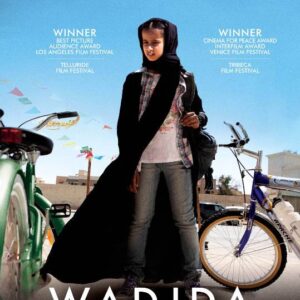“Don’t you know that girls don’t ride bikes?”
Abdullah (Abdullrahman Al Gohani) scorned Wadjda, a sly grin painted on his face. Amused by her friend’s ignorance, Wadjda (Waad Mohammed) smiled. “Losing to a girl will be a double loss,” she quickly replied. And the two parted ways. Wadjda’s black abaya drifted with the desert breeze. She strolled across Riyadh’s mounds of sand, plotting ways to secure a bicycle, demonstrate her skills, and discredit others’ misplaced doubts. The film “Wadjda” follows a vigorous 10-year-old girl determined to garner enough money to purchase a bike. Haifa al-Mansour’s brilliant film portrays how a patriarchal society subtly hinder the young girl’s playful desires.
Wadjda sets her eyes on an emerald green bicycle with white tires and multicolored ribbons dangling on either side of its handles. It stood firmly outside a local toyshop and cost 800 Saudi Riyals (213 USD), an enormous price for a young girl. Wadjda thus ventures to raise money through means available to a child. She makes colorful friendship bracelets to sell to her classmates. She aids others in their deceitful tasks, all for a generous sum. When an older schoolgirl asks for help securing her surreptitious lover’s signature on a “permission-to-exit” slip, Wadjda gladly complies in exchange for 20 Saudi Riyals. However, Wadjda’s mischiefs eventually land her in the stern headmistress’s office.
Wadjda’s schemes soon shift when she hears of the school’s religious club’s Quran contest. The winning prize, a 1,000 Riyal cash prize, enticed the 10-year-old girl to join the recital competition. Much to her headmistress’s surprise, she abandoned her roguish schemes for a pious act of worship. She trades the money she saved for a Quran memorization toy to help secure the competition’s grand prize and purchase the bicycle.
Throughout the film, Al-Mansour strategically omits details on the character’s casual interactions with misogyny. However, covert reminders of Saudi cultural values are not lost completely in Wadjda’s plots and schemes. Symbolically mirroring real life, patriarchal customs seamlessly seep into Saudi women’s lives, often with unknown reasoning, tethering their worth and livelihoods to men. It is an active hindrance and persists through the whispers and judgments of stifled gossip between other schoolgirls, like the rumor concerning an unknown man’s entrance to the headmistress’s home. Wadjda’s mother (Reem Abdullah) must grapple with her mother-in-law’s demands for her husband to remarry a woman who can bear him a son. She thus prepares extravagant meals and scours the shops for an alluring dress, all to tempt her husband back into her life. The schoolgirls habitually clear the courtyard when they identify men in the distance, urging all “good girls” to follow suit. Yet Wadjda preserves her naive outlook on life, spending her afternoons hanging around with her friend Abdullah on their building rooftop and scheming ways to purchase a bicycle.
Wadjda’s character is an ode to young women who protect their playful, frivolous desires despite others’ denunciations. She boasts her personality unapologetically, ditching the schoolgirl’s typical ballet flats and frilly socks for her raggedy pair of black high-top Converse. She appreciates Western music despite her mother’s pleas insisting “those songs have brought [them] nothing but evil.” Most significantly, Wadjda remains dedicated to her efforts to purchase a bicycle and race her neighbor, an emblematic pursuit that defies cultural restraints. In her attempts to secure a bike, Wadjda clutches onto any glimpse of freedom, privilege, and a sweet childhood without focusing on societal judgments.
Haifa al-Mansour’s intentional cinematography paints Saudi Arabia’s rich landscapes, from gravel roads to stone houses. “Wadjda” features a cast comprising Saudi actors and is the first film shot in Saudi Arabia and directed by a Saudi woman. While al-Mansour does not shy away from criticizing the country’s gender-affiliated barriers, “Wadjda” is one of the first and few to capture Saudi Arabia. She tells a familiar story through an unembellished lens without dwelling on the Islamophobic stereotypes that often follow such narratives. While cultural expectations have changed since the film’s release, for example, women no longer must dress in abayas, “Wadjda” details how one girl’s longing for a bicycle unveils a society’s deep-rooted patriarchal values.
Discussion Questions:
- What does the bicycle symbolize?
- Discuss the scene where Wadjda places her name on the family tree. What is its significance, especially considering her father’s decision to remarry?
- Discuss Wadjda and her mother’s relationship with their driver, Iqbal.
- At the end of the film, Wadjda’s mother offers her daughter a gift. Why? Discuss the scene and its significance.


